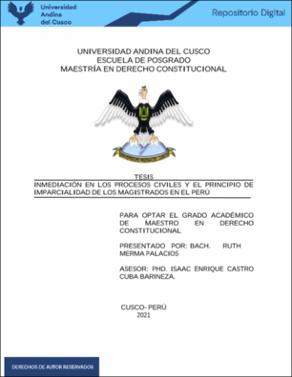| dc.contributor.advisor | Castro Cuba Barineza, Isaac Enrique | |
| dc.contributor.author | Merma Palacios, Ruth | |
| dc.date.accessioned | 2022-04-01T17:32:47Z | |
| dc.date.available | 2022-04-01T17:32:47Z | |
| dc.date.issued | 2021-09-30 | |
| dc.identifier.uri | https://hdl.handle.net/20.500.12557/4499 | |
| dc.description.abstract | El proceso tiene una naturaleza correlativa y participativa de muchos componentes
jurídicos, pero particularmente de sujetos procesales conformado por las partes justiciables,
el Juez y auxiliares de justicia entre otros sujetos abogados, testigos, peritos, etc., los cuales
interactúan, se comunican, se interrelacionan y son interlocutores durante todo el desarrollo
del proceso, por lo que éste, puede considerarse como un ecosistema conjuntivo en el que las
partes, los abogados y el Juez son los protagonistas. Por lo que esta investigación tiene
como problema principal ¿De qué manera la inmediación en los procesos civiles, puede
afectar al principio de imparcialidad de los magistrados en el Perú?, aunado a este el
objetivo determinar si la inmediación en los procesos civiles, puede afectar al principio de
imparcialidad de los magistrados en el Perú. Además, que toda decisión judicial tiene que
estar revestida de la garantía de imparcialidad, esta decisión, por lo tanto, debe tener una
justificación racional por parte del juez; sin embargo, advertimos que dicha decisión está
impulsada por emociones, aspecto que únicamente puede abordarse a través de una
perspectiva Neurocientífica. El presente trabajo de investigación es de enfoque Cualitativo
y tipo de investigación jurídica Dogmático propositivo. Se ha llegado como conclusión
principal que se puede afirmar que el juez civil experimenta como aquello que podemos
denominar emociones dentro del proceso civil hacia las partes procesales, ello revelaría de
que se estaría quebrantando la imparcialidad del juzgador tanto subjetiva y objetiva, la
igualdad de las partes procesales, entendida la imparcialidad bajo sus tres contextos su
imparcialidad e independencia. Enviciándose así el proceso civil hasta el momento de la
emisión de la sentencia. analizando al operador del derecho en su toma de decisiones se encuentra ante un complejo proceso cerebral, donde está ante la participación de lo
cognitivo (racional) y lo emocional (irracional). no solo nos encontramos bajo la óptica de
lo racional, la subsunción del hecho a la norma, sino va más allá, la complejidad en donde
las emociones tienen un impacto significativo en el proceso de la toma de decisión, en el
proceso cerebral del juez civil quien siempre se encontrado influenciado por sus emociones
al momento de formular la regla en que basa su decisión. | es_PE |
| dc.description.abstract | The process has a correlative and participatory nature of many legal components, but
particularly of procedural subjects made up of the defendant parties, the Judge and judicial
assistants among other subjects, lawyers, witnesses, experts, etc., who interact,
communicate, and they interrelate and are interlocutors throughout the development of the
process, so this can be considered as a conjunctive ecosystem in which the parties, the
lawyers and the judge are the protagonists. Therefore, the main problem of this
investigation is: In what way can the immediacy in civil proceedings affect the principle of
impartiality of the magistrates in Peru? In addition to this, the objective Determine if the
immediacy in civil proceedings, it may affect the principle of impartiality of the magistrates
in Peru. Besides that, every judicial decision has to be covered with the guarantee of
impartiality, this decision, therefore, must have a rational justification by the judge;
However, we note that this decision is driven by emotions, an aspect that can only be
approached through a Neuroscientific perspective. This research work is of a Qualitative
approach and a kind of propositional Dogmatic legal research. The main conclusion has
been reached that it can be said that the civil judge experiences what we can call emotions
within the civil process towards the procedural parties, this would reveal that the
impartiality of the judge, both subjective and objective, the equality of the procedural
parties, understanding the impartiality under its three contexts its impartiality and
independence. Thus, the civil process is addicted until the moment the sentence is issued.
Analyzing the operator of law in his decision-making, he finds himself before a complex
brain process, where he is faced with the participation of the cognitive (rational) and the
emotional (irrational). We are not only under the perspective of the rational, the subsumption of the fact to the norm, but it goes beyond the complexity where emotions
have a significant impact on the decision-making process, on the brain process of the civil
judge who has always been influenced by his emotions when formulating the rule on which
he bases his decision. | en_US |
| dc.format | application/pdf | es_PE |
| dc.language.iso | spa | es_PE |
| dc.publisher | Universidad Andina del Cusco | es_PE |
| dc.rights | info:eu-repo/semantics/restrictedAccess | es_PE |
| dc.rights.uri | https://creativecommons.org/licenses/by-nc-nd/4.0/ | es_PE |
| dc.subject | Imparcialidad | es_PE |
| dc.subject | Emociones | es_PE |
| dc.subject | Neurociencia | es_PE |
| dc.title | Inmediación en los procesos civiles y el principio de imparcialidad de los magistrados en el Perú | es_PE |
| dc.type | info:eu-repo/semantics/masterThesis | es_PE |
| thesis.degree.name | Maestra en Derecho Constitucional | es_PE |
| thesis.degree.grantor | Universidad Andina del Cusco. Escuela de Pos Grado | es_PE |
| thesis.degree.discipline | Derecho Constitucional | es_PE |
| dc.publisher.country | PE | es_PE |
| dc.subject.ocde | https://purl.org/pe-repo/ocde/ford#5.05.01 | es_PE |
| renati.advisor.dni | 10281126 | |
| renati.advisor.orcid | https://orcid.org/0000-0001-6892-1787 | es_PE |
| renati.author.dni | 47831632 | |
| renati.discipline | 421577 | es_PE |
| renati.juror | Córdova Huamani, Máximo | |
| renati.juror | Rivero Ynfantas, Fernando | |
| renati.juror | Diaz Torres, José Hildebrando | |
| renati.juror | Ríos Mayorga, Julio Trinidad | |
| renati.level | https://purl.org/pe-repo/renati/level#maestro | es_PE |
| renati.type | https://purl.org/pe-repo/renati/type#tesis | es_PE |



